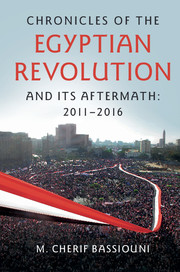Book contents
- Frontmatter
- Dedication
- Contents
- Preface
- Acknowledgments
- List of Abbreviations
- Introduction
- 1 The Early Stage of the Revolution
- 2 Mubarak Relinquishes the Presidency and the SCAF Assumes Power
- 3 A Prelude to Democracy: 2011–2012 Elections
- 4 The Morsi Presidency: June 30, 2012 to July 3, 2013
- 5 The Military's Return to Power and the El-Sisi Presidency
- 6 2015Legislative Elections and the Changing Civilian Political Landscape
- 7 The Military Institution: Its Power, Influence, and Culture
- 8 Violence and Repression
- 9 The Accountability Gap
- 10 The Justice System in Crisis
- 11 The Constitutional Quagmire
- 12 Demographics, Education, and the Economy
- 13 Geopolitical Factors
- 14 Concluding Assessment
- Pictures of the Egyptian Revolution and Related Events
- Bibliography
- Index
7 - The Military Institution: Its Power, Influence, and Culture
Published online by Cambridge University Press: 24 November 2016
- Frontmatter
- Dedication
- Contents
- Preface
- Acknowledgments
- List of Abbreviations
- Introduction
- 1 The Early Stage of the Revolution
- 2 Mubarak Relinquishes the Presidency and the SCAF Assumes Power
- 3 A Prelude to Democracy: 2011–2012 Elections
- 4 The Morsi Presidency: June 30, 2012 to July 3, 2013
- 5 The Military's Return to Power and the El-Sisi Presidency
- 6 2015Legislative Elections and the Changing Civilian Political Landscape
- 7 The Military Institution: Its Power, Influence, and Culture
- 8 Violence and Repression
- 9 The Accountability Gap
- 10 The Justice System in Crisis
- 11 The Constitutional Quagmire
- 12 Demographics, Education, and the Economy
- 13 Geopolitical Factors
- 14 Concluding Assessment
- Pictures of the Egyptian Revolution and Related Events
- Bibliography
- Index
Summary
INTRODUCTION
Egypt's modern army originated in 1805 when the country's new ruler, Mohammad Aly (“Mehmet Ali,” as it is pronounced in Turkish) was appointed to be the Turkish Ottoman Empire's senior military officer for its Egyptian Province. Mohammad Aly was of Albanian origin, but was brought up by the Turks from childhood to become one of their future officers. He seized power in Egypt in an ingenious way, and then proceeded to modernize the country, particularly the new army.
Mohammad Aly's first military expedition, after defeating the Mamluks and solidifying his control of Egypt, was ordered by the Ottoman Sultan to retake the holy cities of Mecca and Medina from the Saudi Wahhabis who had captured them in 1802. From 1811 to 1818, Mohammad Aly sent three armies into the Arabian Peninsula and retook the Hejaz region for the Ottoman Empire. Egyptian forces remained in the Hejaz until 1840.
The Egyptian Army became well known when Ibrahim Pacha, Mohammad Aly's son, sailed sixty warships, one hundred transports, and seventeen thousand men from Egypt to the Peloponnesian peninsula to support the Turkish Sultan against the Greeks and against a joint British and French naval armada, which defeated the Turkish and Egyptian navies at the Battle of Navarino in 1827. This was due to the incompetence of the commanding Turkish Admiral, and Ibrahim Pacha took his remaining forces back to Egypt.
This event and the modernization of both the Egyptian military and economy led Mohammad Aly into a war with his former patron, the Turkish Sultan of the Ottoman Empire. Ibrahim Pacha once again led an army across Lebanon and Syria to Khutaya, only 150 miles from Constantinople, the capital of the Ottoman Empire, in order to pressure the Sultan to give Mohammad Aly the concessions he demanded – most of them were granted.
The Egyptian army, since its inception, has been a national army in that its soldiers and officers were Egyptians. The latter were mostly trained in an Egyptian academy modeled after the famous French Saint Cyr Academy, where a very select few Egyptian officers were sent for staff and general command training.
- Type
- Chapter
- Information
- Publisher: Cambridge University PressPrint publication year: 2016



